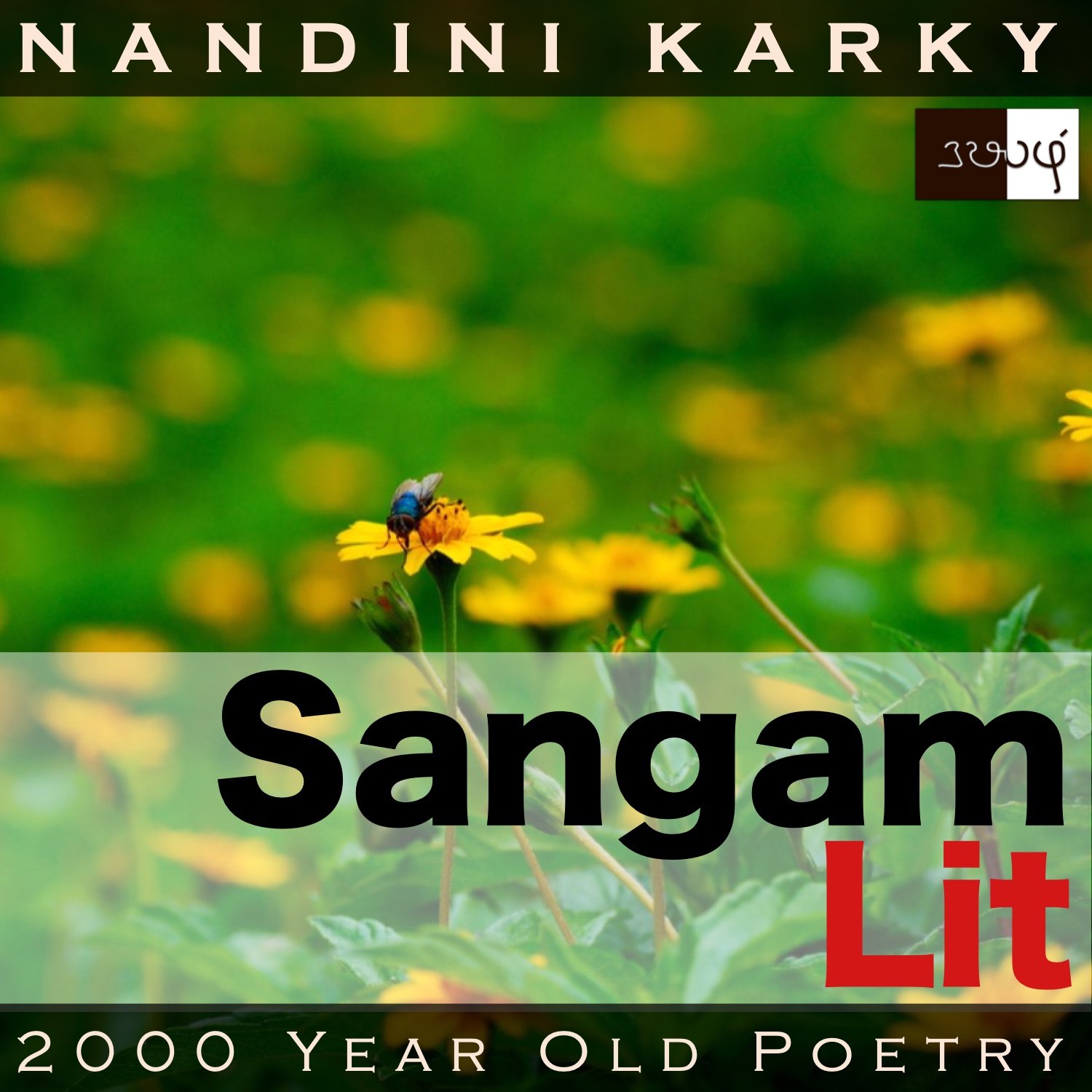Podcast: Play in new window | Download
Subscribe: Apple Podcasts | Spotify | Amazon Music | Android | iHeartRadio | TuneIn | RSS | More

In this episode, we savour the sweetness of Sangam literary work Natrinai 25, written by Peri Saathanaar, set in the ‘Kurinji’ landscape or the mountainous regions, in the words of the lady’s confidante to the lady about an event that transpired the previous day.
அவ் வளை வெரிநின் அரக்கு ஈர்த்தன்ன
செவ்வரி இதழ சேண் நாறு பிடவின்
நறுந்தாது ஆடிய தும்பி பசுங்கேழ்ப்
பொன் உரை கல்லின், நல் நிறம் பெறூஉம்
வளமலை நாடன் நெருநல் நம்மொடு
கிளை மலி சிறு தினைக் கிளி கடிந்து அசைஇ,
சொல்லிடம் பெறாஅன் பெயர்ந்தனன், பெயர்ந்தது
அல்லல் அன்று அது – காதல் அம் தோழி!
தாது உண் வேட்கையின் போது தெரிந்து ஊதா
வண்டு ஓரன்ன அவன் தண்டாக் காட்சி
கண்டும், கழல் தொடி வலித்த என்
பண்பு இல் செய்தி நினைப்பு ஆகின்றே.
The poem fills our nostrils with a sweet scent, as echoed by the words ‘சேண் நாறு’ meaning a fragrance that can be sensed at a distance, and also, coats our tongues with that sweet taste of ‘தாது உண் வேட்கை’ meaning ‘a desire to drink honey’. And then again, the scene we have encountered previously in the Kurinji landscape, wherein the lady and her friend, have the task of chasing away parrots, which come to raid the millet fields, is brought to the fore with the line, ‘கிளை மலி சிறு தினைக் கிளி கடிந்து’. The most exciting find that filled my heart with content was the word ‘நெருநல்’ meaning ‘yesterday’. I never knew that there was such a delicious Tamil word for yesterday. ‘நேற்று’ is the word well-known and after reading this poem, I have come to think that ‘நேற்று’ does not do justice to the charm and beauty of yesterday like ‘நெருநல்’!
Expert eyes that have analysed the nature of this poem’s sweetness tell us that these words are said by the lady’s confidante to the lady, in a subtle reference to the suitability of the man. She narrates thus: “Remember that man from the lush mountains, filled with ‘pidavam’ trees, whose white flowers with red lines looking like a conch shell coated with lines of shiny lac, spread their fragrance far, pulling towards them, the bees that dive into the nectar and emerge shining bright, looking like the touchstone that has been used to rub against gold! Yes, that very man who was here with us yesterday, helping to chase away the parrots, on long branches, intent on stealing our millets. At the end of that task, he left without getting a chance to speak to us. My beloved friend, that’s not what concerns me. I think back of how my bangles loosened at the sight of his handsome looks and am ashamed that I felt this, for someone who is exactly like a bee that thinks not, discerns not, but dives into any and every flower that catches its fancy. I should have known better.”
Does all the sweetness that our eyes see, our ears hear, our buds taste reach the heart? And if it does, does the feeling stay? Every pleasurable sensation is gone in a moment. Even less than that, if we fail to shower it with our attention. Let’s do that now with the few elements encountered. First, of course, is the ‘pidavam’ tree, a new tree that we are adding to our ever-growing list of ancient Tamil trees. This one is known scientifically as the ‘Benkara malabarica’ and is called commonly in Telugu as ‘pedali’, in malayalam as ‘tumpakara’ and in Kannada as ‘timmakare’. The tree exudes its fragrance far into all the adjoining states of the current Tamilnadu, uniting us in our appreciation of this tree’s ancient roots. There are layers of similes in describing the pidavam, first in the description of its flowers as having white petals gently coated with lines of red, like the lac that is drawn on conch shells. Another simile is the sight of a bee that dives into the flower, emerging as if coated with the gold of the touchstone, used to rub against gold to test its strength. The poet’s family is said to be in the trade of a goldsmith and we can see the dexterity with which he brings his livelihood into his lines.
Finally, coming to the regret that the lady’s confidante expresses in her act of yesterday, I’m reminded of how much similar it is to our ruminating about the past and beating ourselves about things said and done. The word was shed in the past. The act was done in the past. But a voice in the head sometimes pulls us down saying, ‘No, you should not have!’ We would never say that to a friend, if one such were to confide in us. But we are severe upon ourselves. Perhaps, if we can be that understanding friend to ourselves and let the past be, we can truly feel the sweetness of ‘நெருநல்’ that ‘yesterday’, tomorrow too!




Share your thoughts...